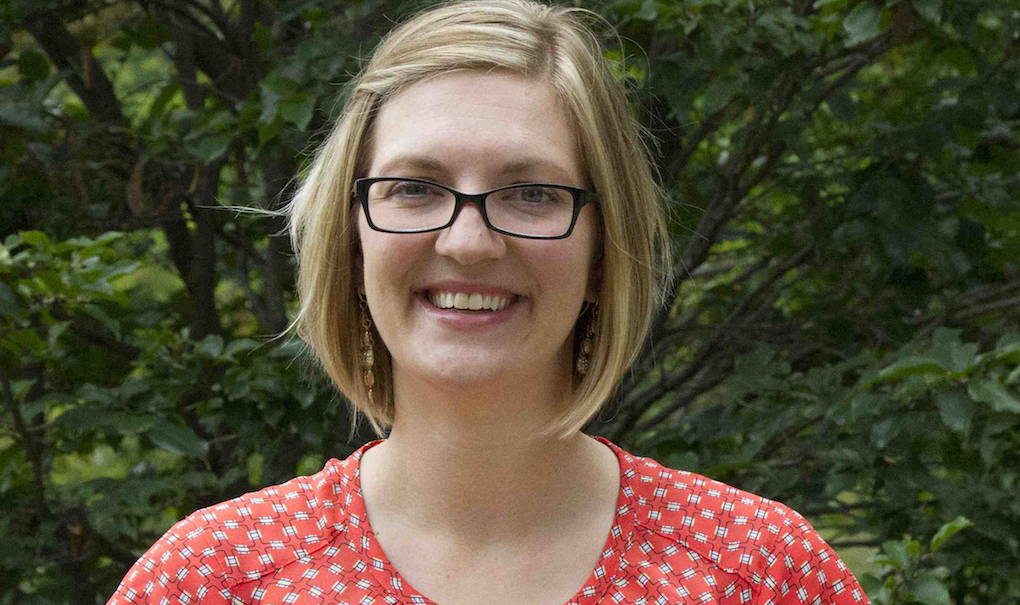Sarah Douglas: Bridging communication gaps for those with disabilities
October 22, 2019 - Liz Schondelmayer
Communication is the key to how we connect with fellow human beings. It is how we express feelings, demonstrate knowledge and share ideas. Which means, for those with developmental disabilities and communication challenges, struggling to interact with those around them can be an extremely frustrating and isolating experience.
Social scientist Dr. Sarah Douglas, an assistant professor in the Department of Human Development and Family Studies at Michigan State University, is addressing these challenges head-on. By working with children with complex communications needs, their educators and their families, Dr. Douglas is creating resources that bridge these communication gaps.
Educating educators and loved ones
 According to Dr. Douglas, children with complex communication needs often struggle to communicate verbally. Thus, they rely on using their hands, tools or technology to convey their thoughts, feelings and ideas. These communication strategies are referred to as Augmentative and Alternative Communication (AAC).
According to Dr. Douglas, children with complex communication needs often struggle to communicate verbally. Thus, they rely on using their hands, tools or technology to convey their thoughts, feelings and ideas. These communication strategies are referred to as Augmentative and Alternative Communication (AAC).
Dr. Douglas’s research is categorized as Communication Partner Training. Her work supports the communication partners in the lives of children who use AAC, including parents, teachers, paraeducators, siblings and peers - and provides them with the tools they need to foster engaging, meaningful communication with the child.
“Language is not learned in isolation, it’s a social process,” explained Dr. Douglas. “For kids with disabilities who have communication challenges, they’re not getting language the same way as other people, because the way that they produce language is different than the way we give them language.”
For example, in 2017, Douglas published two separate research articles in Communication Disorders Quarterly that taught both siblings of children with complex communication needs and parents of children with autism how to best support communication development in their siblings/children. She published a separate study in Infants & Young Children the same year, providing resources for parents of children with complex communication needs.
In general, Dr. Douglas emphasizes the use of certain strategies, such as using the same tools and methods to communicate the child does, providing many opportunities for the child to communicate, allowing proper time for the child to respond and, most importantly, always responding to the child so that they never feel ignored.
Motivating children who use AAC to put the necessary effort into communicating can be a challenge as well, according to Dr. Douglas. But incorporating communication into playtime and learning can make it seem like less of a chore.
Defeating stigma
When she isn’t working with communication partners specifically, Dr. Douglas also conducts research about the experiences of those living with disabilities and those who use AAC and their families. One of her current studies focuses specifically on the experiences of parents when they find out their child has down syndrome, and has revealed a troublingly persistent stigma against people living with the disability.
For many families, receiving a diagnosis of down syndrome feels like a loss and triggers a grieving process. But much of that reaction is fueled by the way diagnoses are delivered by doctors.
“How a doctor delivers this news really sets the tone for the family to move forward,” explained Dr. Douglas. “When they express sympathy and direct parents to resources to immediately terminate the pregnancy, that sets a very different tone than offering resources to support the child.”
Dr. Douglas is hopeful that this research can help defeat the stigma that people with down syndrome face, and give families a full picture of what life with a child with down syndrome can look like. According to Dr. Douglas, people with down syndrome can graduate from college, hold down jobs, live independently and even get married.
“A lot of parents who were in this particular study have said, 'I want to tell that doctor that delivered the diagnosis about all of the joy I’ve had in my life because of my child with down syndrome,’” noted Dr. Douglas.
Creating communication tools for success
“Communication is the essence of life, so if you don’t have that skill, people don’t see you as competent,” said Dr. Douglas. “Communication is that gateway that helps these individuals show what they know and connect with the other people in their lives.”
Moving forward, Dr. Douglas will continue her research on how best to meet the needs of children with communication challenges, and to teach the next generation of educators how to ensure these children have the best educational experience possible.

